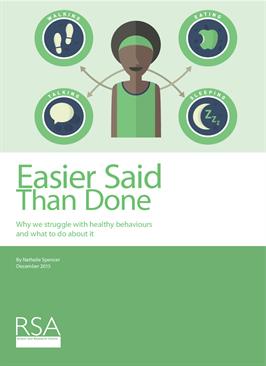Many of us know what we should be doing to live healthily, yet many of us struggle to actually actively manage our health.
In 'Easier Said than Done', we set out some of the reasons why we might find it hard to live in a healthy way, exercising, eating well, getting adequate sleep, and checking for early warning symptoms. Perhaps most importantly, we look to the field of behavioural science for strategies that people can use to overcome those hurdles and to initiate lifestyle changes. These include:
- Commitment devices, where we make it very unattractive to not follow through on an intention;
- Temptation bundling, where we pair an indulgent behaviour with a prudent one;
- Implementation plans, where we set out the specifics of our desired behaviour.
Changing existing behaviour can be a difficult task, but with the help of these strategies new behaviours can become habitual, facilitating a long-term sustained healthy lifestyle.
This paper is a stimulus to a broader programme of public engagement on issues of health and wellbeing at the RSA. The hope is that it will provoke thought around how to facilitate healthy living through a variety of approaches, not least by helping us to follow through on good intentions of actively managing our health.
Find our more about why we struggle with healthy behaviours (blog)
Read the report online 'Easier Said than Done' (via Medium)
Download the full report, 'Easier Said than Done'
pdf 934.1 KB
Contributors


Be the first to write a comment
Comments
Please login to post a comment or reply
Don't have an account? Click here to register.